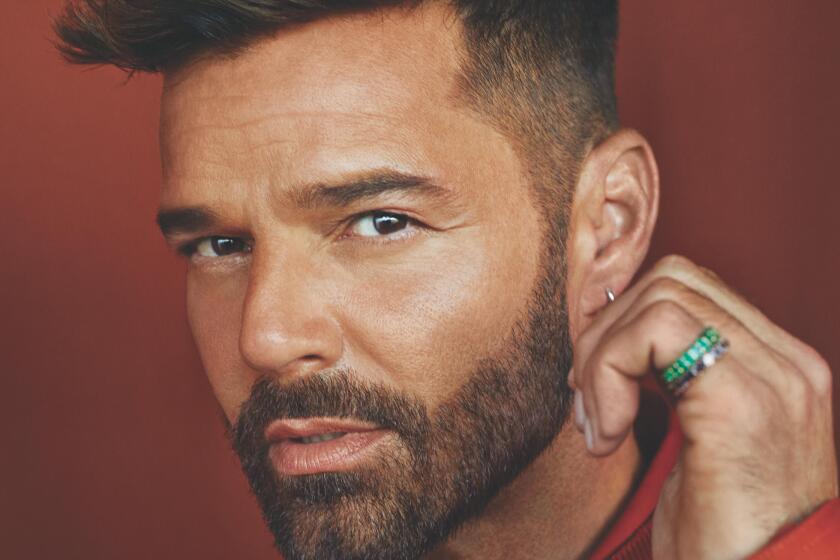Meshell Ndegeocello talks Nina Simone ahead of Royce Hall date
Meshell Ndegeocello’s place in pop culture has shrunk since her mid-’90s days on MTV. But her talent has only grown. In October the New York-based singer-bassist released the stunningly beautiful “Pour Une Âme Souveraine,” a collection of songs written or popularized by Nina Simone featuring guest appearances by Sinead O’Connor, Cody Chesnutt, Lizz Wright and others. Pop & Hiss caught up with Ndegeocello ahead of her show Friday night at UCLA’s Royce Hall.
“Pour Une Âme Souveraine” follows recent tributes you’ve done to Prince and Fats Waller. What do you get out of these kinds of projects?
It’s interesting to do other people’s music -- that’s how I learned to play, by learning other people’s songs. It’s nice to delve into how other people got to where they are.
Did making this record change your thinking about Simone?
I have more reverence toward her.
That reverence distinguishes this project from your Prince tribute, in which you seemed more conflicted about him and his work.
I’ve never met her, and I’ve met him. So I’m able to have honest thoughts about how I feel about our interactions. Whereas she only lives in my mind from what I’ve read in books and what I’ve heard from recordings and videos. There’s still a distance to have that reverence. Knowing someone allows you to hate them [laughs].
You mentioned in a recent interview with NPR that part of the pain in Simone’s music derived from her dealings with the record industry. Can you relate to that?
Oh yeah. I recently had a legal team look back [at some of my contracts], and they were like, “It’s just incredible that that was your deal -- that [the labels] thought that was fair.”
Is your relationship with the industry different from what it used to be?
Now I just think of the record company as a patron. I try to think of interesting projects and products to make, then I try to convince them to fund them. I know that sounds pretty crass, but I’ve been doing this for a long time, and that’s just the way it is.
Before the French label Naïve funded “Pour Une Âme Souveraine,” it put out your 2011 studio record, “Weather,” which you made here in L.A. with the producer Joe Henry. “Weather” was frequently compared to “Bitter,” from 1999.
Joe Henry and myself, we’re the mind children of Craig Street, who produced “Bitter” and also some of Joe’s records. So if there are any similarities, I think they’re just the things we learned from Craig. [On “Weather”] I tried to concentrate on songwriting instead of any production tricks.
What led you to Joe?
I’ve known him for a very long time. And I think I was at a crossroads: I’d made a record for the Downtown label, but I don’t think they understood what I was trying to achieve. Then there was an offer from Naïve, but I think they needed a kind of figurehead to make it happen, so that even if I failed at least I had someone who would do the best for me.
Have your versions of the Nina Simone songs changed on tour?
Oh my God, yes. For one thing, we have a different drummer [than on the album], so they’ve definitely taken on their own life. And the record has a bunch of guests. Remember when Nate Dogg made his own record, but then he couldn’t tour it because he had so many guests? I know how he feels.
Among those guests, Sinead O’Connor is especially welcome. Her album from earlier this year, “How About I Be Me (And You Be You)?,” didn’t get the attention it deserves.
It’s a total sleeper. We played a show in Australia together, us and Rickie Lee Jones and John Cale. And we did this Curtis Mayfield tribute [in July in New York]. I’m such a fan of hers -- she’s so open and warm and has this amazing, unusual mind. She’s very much like Nina, with the uniqueness of her voice and her ability to transfer emotion in song to the listener. I think she’s as much of an icon as Nina.
Why do you think “How About I Be Me” has been overlooked?
Because we concentrate more on artists’ personal lives than we do the art they create. Her personal life overshadows the music.
You might think the problems in her life would attract attention.
Hers aren’t glamorous, though -- they’re really deep-seated mental-health issues that border on some social-political ledges.
Do you think her music helps to exorcise those troubles?
Man, I’m like an Islamic atheist: Whatever gift it is that she has comes in the form of something I don’t understand. We’re all just bags of bones and muscle and hormones; I’ll never understand what makes our minds do the things we do. It’s like that statue of the monkey holding a skull. We’re trying to use a thing we don’t understand to understand ourselves.
And what about Nina Simone? How does struggle factor into her music?
Her music has great sadness but also great joy. It’s super-sexy but also profound. And even when it’s sad, the fact that she’s translated her feeling to you -- that’s the triumph to me.
ALSO:
Janet Klein finds something old is new again
Robert Glasper’s ‘Black Radio’: Is all that jazz?
Review: Shuggie Otis’ efforts are frustrated at the Echoplex
More to Read
The biggest entertainment stories
Get our big stories about Hollywood, film, television, music, arts, culture and more right in your inbox as soon as they publish.
You may occasionally receive promotional content from the Los Angeles Times.







